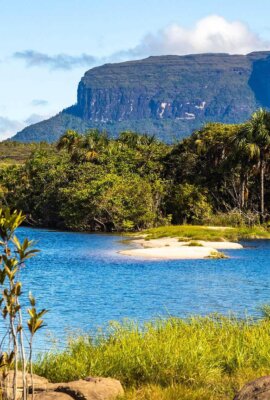Your full Wanderlust guide to
Puerto Rico

Puerto Rico is a boggling mix of Anglo and Latino, modernity and simple West Indies, busy city and easy island life – and ideal for exploration. Old colonial San Juan has streets of pretty restored buildings, and offers museum and cultural interest by day (this is the oldest corner of the US) and buzzing nightlife.
Then set off, driving (of course – this is the States) to explore. Not far from the city you will find coffee factories, restored Arawak settlements and Arecibo, the largest satellite dish in the world – it sought out quasars and pulsars.
Lastly the beach. Oddly, the finest are actually offshore, a short flight or ferry ride away, on Puerto Rico’s tiny islands, Vieques (the fallback home of the Royal Navy in the Second World War) and Culebra, which has good sailing. Both have a small-island air, Latin-style. Vieques boasts a spectacular phosphorescent lagoon.
Take a dip and discover the island’s abundant reefs and corals off shore, home to some of the richest seas in the Caribbean.
You can’t miss

Although many islanders speak English, it’s best to learn a few basics in Spanish as well. Once you leave the cities and larger towns, you’ll find less people able to speak English. Plus chatting to a local in their language is more of an experience!
Latest Puerto Rico articles
Wanderlust recommends
- Explore Old San Juan The island’s capital city is home to one of the grandest colonial towns in the Caribbean. Get lost in a maze of back streets, rainbow-coloured buildings and elegant townhouses.
- Sample piña coladas Inventors of the world-famous cocktail, visitors to the island should taste a glass or two on home grown soil. Stop by shacks at the side of the road or chill out in one of San Juan’s coolest tearrace bars – the choice is yours.
- Turtle watch on Culebra Cruise to neighbouring island Culebra and volunteer to stalk the beach at night looking for egg-laying leatherback turtles.
- Discover El Yunque National Park Trek through Peurto Rico’s steamy jungle to experience utter wilderness and – if you can handle the hike – climb the 3,000ft peaks to survey panoramic views of much of the island.
- Awe at Bioluminiscent Bay, Vieques Best seen on a pitch black, moonless night from a kayak. Every movement in the water sets off cascades and vortices of glowing bioluminescence.
When to go
Peak tourist season runs from December through to April, July and August. Recently, the island has become popular with US students on spring break during February and March.
Weatherwise, the temperatures are around 31°C from June to October. The island’s driest period is from January to April. However, Puerto Rico doesn’t have a distinct dry and wet season – showers can be experienced all year round.
International airports
Aeropuerto Internacional Luis Muñoz Marín is around 15km from San Juan’s city centre.
Getting around
You’d think as a relatively small island Puerto Rico would be easy to travel around. However, with a train line which stopped service in the 1950s and a patchy bus network things get a little difficult if you’re planning on using public transport. Instead pick up a hire car or motorbike and explore the island in your own time.
Accommodation
There’s a whole host of accommodation choices for you to explore. Hotels, homestays, cabanas, campgrounds and villas are all available.
Food & drink
Blend Spanish, Taíno, American and African cuisine and you’ll cook up a Puerto Rican feast. Sample traditional cuisine quite unlike either Cuban or Dominican. Try deep-fried fritters, bocadillos (sandwiches), or plantains (savoury bananas) as a snack, to keep you going between meals.
Puerto Rico is also famously the inventor of the piña colada – blended rum and coconut best enjoyed while watching the sun set.
Health & safety
Puerto Rico’s biggest health risks are sunburn and dehydration. Travellers’ diarrhea is also common. There is no malaria on the island, however dengue fever does occasionally appear.
Aside from the odd petty theft from beaches or San Juan’s dodgier streets, crime is low on the island and rarely affects travellers. Don’t wonder on your own in the dark and use your common sense.











